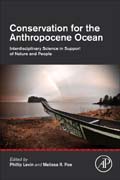
Conservation for the Anthropocene Ocean: Interdisciplinary Science in Support of Nature and People
Levin, Phillip S.
Poe, Melissa R.
Conservation for the Anthropocene Ocean: Interdisciplinary Science in Support of Nature and People emphasizes strategies to better connect the practice of marine conservation with the needs and priorities of a growing global human population. It conceptualizes nature and people as part of shared ecosystems, with interdisciplinary methodologies and science-based applications for coupled sustainability. A central challenge facing conservation is the development of practical means for addressing the interconnectedness of ecosystem health and human well-being, advancing the fundamental interdisciplinary science that underlies conservation practice, and implementing this science in decisions to manage, preserve, and restore ocean ecosystems. Though humans have intentionally and unintentionally reshaped their environments for thousands of years, the scale and scope of human influence upon the oceans in the Anthropocene is unprecedented. Ocean science has increased our knowledge of the threats and impacts to ecological integrity, yet the unique scale and scope of changes increases uncertainty about responses of dynamic socio-ecological systems. Thus, to understand and protect the biodiversity of the ocean and ameliorate the negative impacts of ocean change on people, it is critical to understand human beliefs, values, behaviors, and impacts. Conversely, on a human-dominated planet, it is impossible to understand and address human well-being and chart a course for sustainable use of the oceans without understanding the implications of environmental change for human societies that depend on marine ecosystems and resources. This work therefore presents a timely, needed, and interdisciplinary approach to the conservation of our oceans. Helps marine conservation scientists apply principles from oceanography, ecology, anthropology, economics, political science, and other natural and social sciences to manage and preserve marine biodiversityFacilitates understanding of how and why social and environmental processes are coupled in the quest to achieve healthy and sustainable oceansUses a combination of expository material, practical approaches, and forward-looking theoretical discussions to enhance value for readers as they consider conservation research, management and planning INDICE: I. Setting the stage 1. Strategies for Bridging the Science-Policy Interface for Adaptive Solutions in the Anthropocene Jenna Sullivan, Elizabeth Cerny-Chipman, Andrew Rosenberg and Jane Lubchenco 2. Climate Variability, Climate Change, and Conservation in a Dynamic Ocean Malin Pinsky and Becca Selden 3. The Future of Species in the Anthropocene Seas Nick Dulvy and Holly Kindsvater 4. How Can the Oceans Feed 9 Billion People? Zachary Koehn, Eddie Allison, Nicole Franz and Esther Wiegers 5. Social Resilience in the Anthropocene Ocean Elena Finkbeiner, Kirsten Oleson and Jack Kittinger II. Principles for Conservation in the Anthropocene 6. Principles for Interdisciplinary Conservation Heather Leslie 7. Creating Space for Community in Marine Conservation and Management: mapping communities-at-sea? Kevin St. Martin and Julia Olson 8. Conservation Actions at Global and Local Scales in Marine Social-Ecological Systems: status, gaps, and ways forward Natalie C. Ban, Aerin Jacob, Charlotte Whitney, Darienne Lancaster, Tammy Davies and Lauren Eckert 9. Ocean Cultures: Northwest coast ecosystems and indigenous management systems Darcy Mathews and Nancy Turner 10. Blurred Lines: what's a non-native species in the Anthropocene ocean? Isabelle M. Côté 11. Can Ecosystem Services Make Conservation Normal and Commonplace? Kai Chan, Paige Olmsted, Nathan Bennett, Sarah Klain and Elizabeth A. Williams 12. Beyond Privatization: rethinking fisheries stewardship and conservation in the North Pacific Rachel Donkersloot and Courtney Carothers 13. Addressing Socio-Ecological Tipping Points and Safe Operating Spaces in the Anthropocene Ben Halpern III. Conservation in the Anthropocene in Practice 14. Stakeholder Participation in Marine Management: the importance of transparency and rules for participation Christine Röckmann, Marloes Kraan, David Goldsborough and Luc van Hoof 15. Marine Conservation as Complex Cooperative and Competitive Human Interactions Xavier Basurto, E. Blanco, M. Nenadovic and B. Vollan 16. Transdisciplinary Research for Conservation and Sustainable Development Planning in the Caribbean Katie K. Arkema and Mary Ruckleshaus 17. Social-Ecological Trade-Offs in Baltic Sea Fisheries Management Rüdiger Voss, Martin F. Quaas, Julia Hoffmann and Jörn O. Schmidt 18. Human Rights and the Sustainability of Fisheries Sara G. Lewis, Aurora Alifano, Mariah Boyle and Marc Mangel IV. Looking Forward 19. Implications of a Changing Climate for Food Sovereignty in Coastal British Columbia Terre Satterfield, Leslie Robertson, Nathan Vadeboncoeur and Anton Pitts 20. The Future of Modelling to Support Conservation Decisions in the Anthropocene Ocean Eva Plaganyi and Beth Fulton 21. The Big Role of Coastal Communities and Small-Scale Fishers in Ocean Conservation Anthony Charles 22. Innovations in Collaborative Science: Advancing citizen science, crowdsourcing and participatory modeling to understand and manage marine social-ecological systems Stephen Gray and Steven Scyphers 23. Looking Forward: interconnectedness in the Anthropocene ocean Melissa Poe and Phillip Levin
- ISBN: 978-0-12-805375-1
- Editorial: Academic Press
- Encuadernacion: Rústica
- Páginas: 504
- Fecha Publicación: 15/06/2017
- Nº Volúmenes: 1
- Idioma: Inglés
